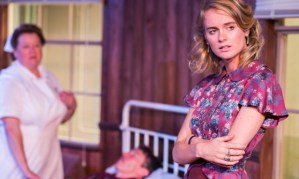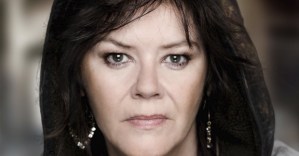Review: Doubt: A Parable (Southwark Playhouse)
Ché Walker directs Stella Gonet in this revival of John Patrick Shanley’s 2004 play
Just before setting off to see John Patrick Shanley’s Doubt, set in a Catholic school in New York in 1964, I listened to the radio obituary of Cormac Murphy-O’Connor, former leader of the Catholic church in Britain. He was, said the commentator, always wracked with guilt about his mishandling of an abuse case which allowed a paedophile priest continued access to children.
The strength and the weakness of Shanley’s play is that while it purports to be about exactly the kind of scandal the Catholic church has faced and failed to solve, it decides to pull its punches, to leave questions of guilt and innocence up in the air in pursuit of a wider discussion about the nature of faith itself. Since it was written in 2005, the playwright could have made different choices; the historical setting allows him latitude.
That said, it’s still a gripping little melodrama as attested by the fact that a film (starring Meryl Streep and Philip Seymour Hoffman) followed its award-winning Broadway run. And it’s a clever choice for Southwark Playhouse. Its claustrophobic setting suits the limitations of the space with PJ McEvoy’s decorated cruciform platform in the centre of the acting area providing an ecclesiastical mood without overwhelming the actors.
Doubt‘s chief protagonist is Sister Aloysius (Stella Gonet), martinet head of the St Nicholas Church School, a traditionalist nun committed to discipline and order. Her foe is the priest at the school, Father Flynn (Jonathan Chambers), a moderniser, who wants the church to show more compassion, warmth and understanding in its dealings with its pupils and the community. In between them stands Sister James, a young idealist who suffers her own crisis of faith.
Sister Aloysius becomes convinced – with no real evidence – that Flynn’s relationship with one of the boys – the first black child in the Irish Italian school – is inappropriate. Flynn denies it. The key question is whether the Sister’s hatred of everything Flynn stands for is feeding her implacable campaign against him. The audience is left to make up its own mind.
The arguments are at first rather stickily expounded, but Ché Walker’s production eventually finds its feet, as Flynn displays both the persuasive oratory of a born leader and the arrogant assumption of unquestioned power that the structure of the church endowed upon him. Her righteous indignation at the way men hold all the cards is one of Sister Aloysius’s most endearing qualities but in Gonet’s performance her harshness is perhaps over-emphasised at the expense of the genuine care for her pupils that her fierce exterior conceals.
Chambers too is better at expressing rage than compassion but Clare Latham gives a convincing performance as the young nun whose innocent convictions are challenged by the accusations swirling around her. And the stand-out scene is the one in which Jo Martin, as the boy’s mother, confronts Sister Aloysius with the complexities of the world outside the church. Martin’s performance has a passion which the evening lacks; it blazes where the rest is a slow simmer.
Doubt runs at Southwark Playhouse until 30 September.
















